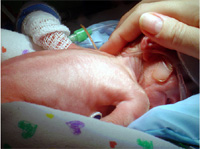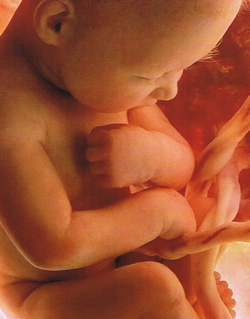Cholestasis During Pregnancy – Are You At Risk?
 It is not at all uncommon for some women to experience a very severe itching in the last trimester of their pregnancy. In some cases, where the itchiness is not too severe, this is just a result of their skin stretching as their baby grows. However, there is another complication, known as cholestasis, and this is a liver disease that only happens in pregnancy as a result of the high amounts of pregnancy related hormones, which will result in severe itching.
The Cincinnati Children’s Hospital Medical Center states that Cholestasis occurs in about 1 out of 1,000 pregnancies – and is more common in Swedish and Chilean ethnic groups, although it is not exclusive to these groups.
It is not at all uncommon for some women to experience a very severe itching in the last trimester of their pregnancy. In some cases, where the itchiness is not too severe, this is just a result of their skin stretching as their baby grows. However, there is another complication, known as cholestasis, and this is a liver disease that only happens in pregnancy as a result of the high amounts of pregnancy related hormones, which will result in severe itching.
The Cincinnati Children’s Hospital Medical Center states that Cholestasis occurs in about 1 out of 1,000 pregnancies – and is more common in Swedish and Chilean ethnic groups, although it is not exclusive to these groups.
What causes Cholestasis?
Bile is produced by the liver and the increased level of pregnancy related hormones can sometimes slow down or even prevent the release of the flow of bile. The slow down or prevention of the release of bile causes a build up of bile acids in the liver which can spill into the bloodstream.Symptoms of Cholestasis of pregnancy
Less common symptoms may also include:Itching, particularly on the hands and feet (often is the only symptom noticed)
Dark urine color
Light coloring of bowel movements
Fatigue or exhaustion
Loss of appetite
Depression
Jaundice
Upper-Right Quadrant Pain
Nausea
Am I at risk of developing Cholestasis while pregnant?
You may have a greater chance of developing cholestasis during your pregnancy ifWomen carrying twins or multiples
Women who have previous liver damage
Women whose mother or sisters had Cholestasis
How will your baby be affected?
If you are diagnosed with Cholestasis then there are certain risks which are placed on your baby. This is because your developing baby relies on your liver to remove bile acids from the blood, so if the bile is not being removed from the blood efficiently there is a increased level of stress which is placed on your babys liver. Your baby will be at risk for:If you do have cholestasis your health care provider will monitor you over the course of your pregnancy, and it is not uncommon that labor is induced when your babys lungs have reached maturity.fetal distress
preterm birth
stillbirth
How is Cholestasis Treated?
The treatment goals for cholestasis of pregnancy are two parts; to relieve the itching and to reduce the impact of the complication on both you and your baby. Common treatment methods include:Treatment for cholestasis needs to be determined by your healthcare provider, and will be determined accroding to:Topical anti-itch medications or medication with corticosteroids
Medication to decrease the concentration of bile acids
Cold baths and ice water slow down the flow of blood in the body
Dexamethansone – which is a steroid which will increases the maturity of your babys lungs
Vitamin K supplements administered to the mother before delivery and again once the baby is born to prevent intracranial hemorrhaging
Dandelion Root and Milk Thistle are natural substances that are beneficial to the liver
Bi-weekly non-stress tests
Regular blood tests monitoring both bile serum levels and liver function
Treatments that should not be used for Cholestasis include:Your pregnancy, overall health, and medical history
The extent of the disease
Your tolerance of specific medications, procedures, or therapies
Expectations for the course of the disease
Your opinion or preference
Antihistamines
Aveeno and Oatmeal Bath
Asthma While Pregnant



